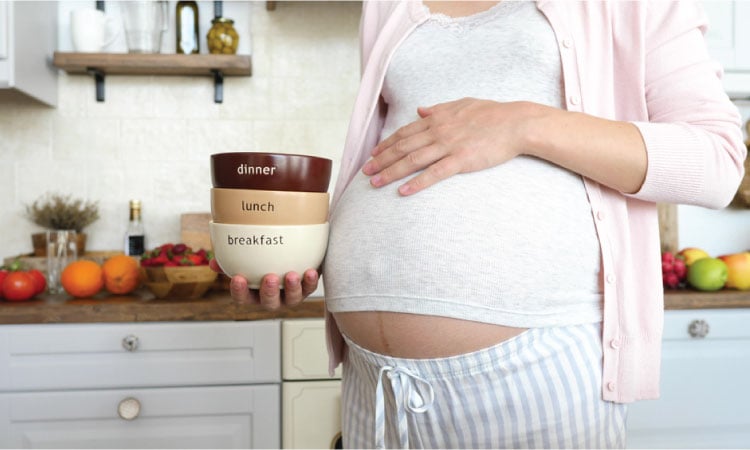The quality and quantity of food are equally important during pregnancy. Likewise, the frequency of food intake during pregnancy also influences the pregnancy outcome. If you are considering skipping meals during pregnancy, this page is for you.
It is always important to make sure you are eating highly nutritious food during pregnancy. It is what you eat that supplies vital nutrients for the growing fetus. Likewise, it is equally important to maintain an optimum sugar level during pregnancy.
That is why health experts recommend during pregnancy does not to go more than three hours at a stretch without eating (sleeping time excluded). It doesn’t mean you have to eat a full meal every 3 hours, but to munch on healthy snacks or fruits besides breakfast, lunch, and dinner.

What Happens If I Skip Meals During Pregnancy?
If you ask does skipping meals affect a pregnancy, the answer is yes, it will.
We are not talking about accidentally skipping meals during pregnancy. Skipping meals once in a while will not create any consequences. This is all about purposefully skipping meals frequently during pregnancy.
According to studies, skipping meals during pregnancy evidently increases the risk of preterm birth. An optimal pattern of food intake is considered as three meals and two or more snacks per day.
Dr Ankita Patel Tayal, our panel gynaecologist says that the baby in the womb fully depends on the mother’s food for its nutrients. The nutrient from the food gets into the mother’s system. All the vital nutrients for fetal development reach the fetus through the placenta.
Therefore mother’s meals are crucial for the proper development of the baby. The fetus will also experience the ill effects of skipping meals during pregnancy. The mother will feel her energy level is falling significantly when she skips the meal.
Calculate Due Date With LMP
It is very important the mother should maintain an optimum energy level to carry on a healthy pregnancy. Now let us try to understand what happens if you don’t eat enough while pregnant.
Skipping meals during early pregnancy
The first few months of pregnancy are very crucial as many things are at work during this phase. It is during this time all the vital organs of the baby are formed. There will be an increased requirement of certain minerals and nutrients during this time for the proper development of the fetus.
Therefore, skipping meals during early pregnancy might bring about nutrition deficiencies, which in turn can impair fetal development. To ensure the best possible pregnancy outcome, you should make sure to have a steady intake of nutritious food during this phase of pregnancy.
Skipping meals during late pregnancy
Many mothers tend to skip meals during the third trimester. This can be due to various reasons like growing fetus might apply pressure in the stomach and reduce the room for food, expecting mother might be worried about increased weight and skips meals purposefully to control weight gain, the tension of the approaching labor, etc.
The third trimester of pregnancy is crucial for the baby’s growth. The third trimester means a big growth spurt for the baby. The baby starts to put on around 225 grams of weight every week.
It is during this time the baby is prepared to enter the new world. Fat layers start to appear under the skin, lung development speeds up, skin becomes more mature, and the baby increase in length and weight.
Skipping meals during late pregnancy will definitely take a toll on the baby’s this growth spurt. Therefore, whatever your reasons might be, skipping meals during late pregnancy is a big NO-NO.
What Happens If I Skip Breakfast During Pregnancy?

Pregnant or not pregnant, breakfast is considered the most important meal of the day. When you get up in the morning, your metabolism will be at its peak. If you fail to fuel your body, then it will be affected.
Pregnancy, however, increases the importance of breakfast to the highest degree. This is because, by morning, the expecting mother is already gone without food and water for around 8 to 12 hours.
Adding more hours to this can impact the pregnant body in many ways. Starving for too long during pregnancy could create many physiological upheavals, which can have an impact on both mother and unborn baby. According to studies, breakfast skippers are found to have a significantly low level of vital nutrients circulating when compared with expecting mothers who never skip their breakfast.
Skipping breakfast or having breakfast late during pregnancy more often triggers lightheadedness and aggravates nausea and vomiting.
Many mothers tend to skip breakfast, fearing it might aggravate morning sickness. Conversely, skipping breakfast and an empty stomach actually makes morning sickness worse. In fact, one of the tips to ward off morning sickness is to munch on some saltine crackers or dry toast before getting from bed in the morning.
How Long Can I Go Without Eating While Pregnant?
According to studies going without food for more than 13 hours during pregnancy increases the level of maternal corticotrophin-releasing hormone (CRH). A heightened level of placental CRH during pregnancy can bring about spontaneous preterm birth.
On the other hand, going without food for less than thirteen hours may not carry this risk. So, make sure during pregnancy you never go without food at a stretch for more than 13 hours. If you cross this mark, the unborn child will be depleted of essential nutrients for healthy development.
Even then, to lead a healthy pregnancy and proper development of the fetus, it is always better to eat every three to four hours to maintain optimum sugar level and continuous supply of nutrients. Or else not only the fetus but also the mother might experience some health issues.
Note: It takes about 3-4 hours to properly digest a meal. Therefore, a gap of 4 hours should be there in between two meals. However, if the gap turns longer, it can pave the way for acidity. Here comes the importance of mid-meal snacking.
Is It OK To Go To Bed Hungry While Pregnant?
Going to bed hungry while pregnant implies waking up extremely hungry. This might bring about or aggravate issues like acid reflux, vomiting, extreme fatigue, dizziness, low pressure, etc. Waking up hungry will also make you cranky, especially when the mood swings max out.
Also, going to bed hungry while pregnant might wake the woman in the middle of the night feeling famished and grouchy due to hunger pangs. This will impair sleep. Eating at midnight increases the risk of putting on unnecessary weight as well.
Related Reading: 12 Best Foods For Baby Brain Development
Even though skipping dinner is something you should avoid during pregnancy, it is also important to understand when and what to eat for dinner. Eat dinner 2 hours before bedtime. Never eat food that triggers heartburn for dinner. Also, make the dinner light.
Going to bed on a full stomach is as bad as going to bed hungry. Digestive discomfort is as annoying as an empty stomach.
What Happens To Baby If Mother Is Hungry During Pregnancy?
Nutritious and consistent food intake is important during pregnancy. Proper nutrition is essential for the healthy growth and development of the fetus. A hungry mother who goes without food for an extended time puts her health in jeopardy and the unborn baby’s well-being as well.
A starving mother blocks essential nutrients for the fetus. A baby who receives insufficient vitamins and minerals from its mother faces increased risks of health issues and birth defects.
According to a source, fetal death associated with maternal starvation is rare. More often, the fetus will probably not die until the mother does due to starvation. Even then, maternal starvation is found to bring about low birth weight, poor eye and brain development, and mental disorders in the fetus.
Why Is It Said To Eat Meal At Time During Pregnancy?

Dr Ankita Patel Tayal, MD OBGYN, says that issues related to indigestion are very common during pregnancy. Eating food on time will help to alleviate the majority of these issues. It is important to sync the mealtime with the body clock.
This is because, even though the digestive juices are secreted continuously, the metabolism and digestion peaks and weakens at a particular time of day. Eating food accordingly helps to alleviate indigestion and issues like acidity and gas formation.
According to experts:
- Have breakfast within two hours after waking up.
- Have lunch between 12 pm-2 pm as this is the time when the digestive power peaks
- Dinner should be finished before 8 pm. The trick is to have a four-hour gap between lunch and dinner and also two hours gap between dinner time and bedtime.
Following this timetable helps to reduce many issues due to indigestion during pregnancy.
Conclusion
As the pregnancy progresses, all the mother needed is an extra 300 calories. This requirement can be met easily without putting on excessive weight. The doctor will decide the meal plan for overweight and underweight pregnant women.
Remember, skipping meals during pregnancy is not a solution for any issue. Pregnancy is a time where women gain weight rather than losing weight. If you think you are overweight, talk to your doctor about it.
